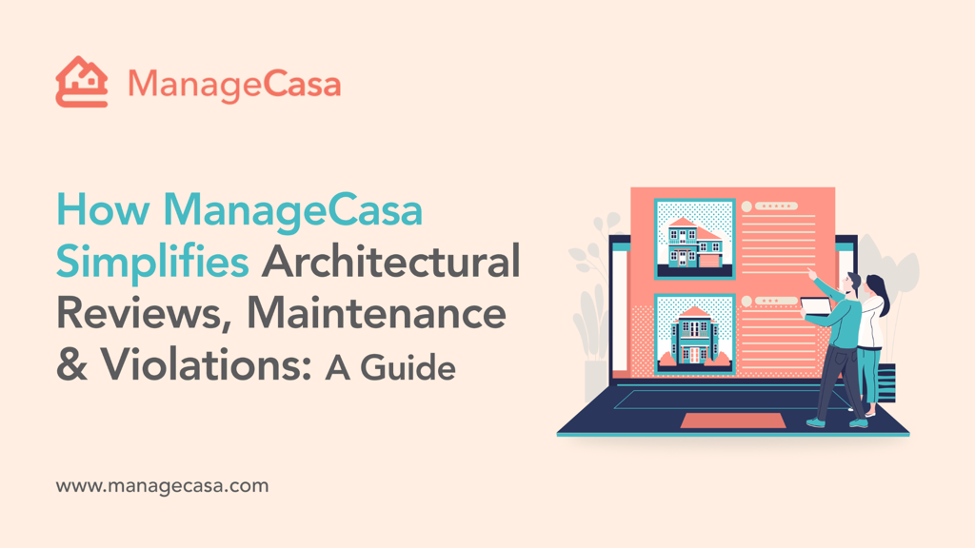Homeowners Associations (HOAs) play a vital role in shaping our communities. They help maintain a beautiful aesthetic that contributes to a high quality of life. However, receiving a violation notice from your HOA can be a stressful experience. Don’t panic! This comprehensive guide will equip you to handle HOA violations effectively.
The key is clear communication. Understanding the HOA’s perspective and following the proper steps will help you resolve the issue smoothly and maintain a harmonious relationship with your neighbors. This guide will walk you through the process. But first, let’s look at some tips you can follow to avoid some of the most common HOA violations.
So, read on and breathe easy!
Common HOA Violations and How to Avoid Them

HOAs establish rules to maintain a community’s aesthetic and functional standards. Violating these rules can lead to fines, legal action, or other penalties. Understanding the most common HOA violations and how to avoid them can help homeowners maintain compliance and enjoy a harmonious living environment. Here are some of the most frequent HOA violations and tips on how to avoid them:
1. Exterior Modifications Without Approval
Violation: Making changes to the exterior of your home, such as painting, adding a fence, or installing new landscaping, without obtaining prior approval from the HOA.
How to Avoid?
- Review the CC&Rs: Before making any exterior changes, review your HOA’s Covenants, Conditions, and Restrictions (CC&Rs) to understand the approval process.
- Submit Requests: Follow the proper procedures to submit modification requests to the HOA board and await approval before proceeding.
- Document Changes: Keep records of all communications and approvals related to the modifications.
2. Improper Lawn & Landscaping Maintenance
Violation: Failing to maintain your lawn and landscaping according to community standards, such as neglecting to mow the lawn, trim bushes, or remove weeds.
How to Avoid?
- Regular Maintenance: Develop a routine for lawn care and landscaping maintenance to keep your property compliant.
- Hire Professionals: Consider hiring a landscaping service if you cannot maintain the yard.
- Check Guidelines: Review the HOA’s guidelines for acceptable lawn and landscaping maintenance.
3. Parking Violations
Violation: Parking in restricted areas, such as on the street, in front of fire hydrants, or spaces designated for other uses.
How to Avoid?
- Know the Rules: Familiarize yourself with the HOA’s parking regulations, including designated parking areas and restrictions.
- Use Assigned Spaces: Always park in your designated space or garage.
- Visitor Compliance: Ensure that visitors and guests know and comply with the parking rules.
4. Trash & Recycling Violations
Violation: Leaving trash cans, recycling bins, or bulk waste out for extended periods or in unauthorized areas.
How to Avoid?
- Follow Collection Schedules: Put out trash and recycling bins only on designated collection days and remove them promptly after collection.
- Proper Storage: Put storage bins in approved areas, such as behind a fence or in the garage, when not used.
- Bulk Waste Disposal: Adhere to HOA guidelines for disposing of bulk waste or oversized items.
5. Noise Violations
Violation: Creating excessive noise that disturbs neighbors, such as loud music, barking dogs, or late-night parties.
How to Avoid?
- Respect Quiet Hours: Adhere to the community’s quiet hours, typically during nighttime and early morning.
- Manage Pets: Ensure well-trained pets and avoid barking or other disruptive behaviors.
- Be Considerate: Keep noise levels reasonable and inform neighbors if you plan to have a gathering.
6. Unapproved Rentals
Violation: Renting out your home or a portion without HOA approval or violating rental restrictions.
How to Avoid?
- Check Rental Policies: Understand your HOA’s rules regarding rentals, including any restrictions on short-term rentals or subletting.
- Seek Approval: Obtain necessary approvals and follow all HOA property rental procedures.
- Inform Tenants: Ensure tenants know and adhere to HOA rules and regulations.
7. Pet Violations
Violation: Failing to follow pet regulations, such as leash laws, pet waste disposal, and restrictions on certain breeds or sizes.
How to Avoid?
- Leash Pets: Always keep pets on a leash when outside.
- Clean Up: Promptly clean up pet waste and dispose of it properly.
- Adhere to Limits: Follow rules regarding the number, size, and breed of pets allowed in the community.
8. Signage Violations
Violation: Displaying unapproved signs, such as political signs, for-sale signs, or business advertisements.
How to Avoid?
- Know Sign Rules: Review HOA guidelines on the type, size, and placement of signs allowed.
- Seek Approval: Obtain HOA approval for any signs that may require it.
- Follow Duration Limits: Adhere to any restrictions on how long signs can be displayed.
Living in an HOA community fosters a sense of pride in a beautiful and well-maintained environment. The key to smooth sailing lies in understanding your HOA’s expectations! By familiarizing yourself with the rules (CC&Rs), keeping your property up-to-snuff, and maintaining open communication with the HOA board, you can ensure compliance and contribute to a harmonious community. Remember, a little effort goes a long way in creating a place where everyone thrives.
Moreover, if you take care of each aspect mentioned above, the likelihood of violating the laws of HOA becomes slim. However, in cases where you may violate any HOA law, here’s how you may deal with it.
Tackle HOA Violations in 8 Simple Steps!

Facing an HOA violation? Don’t fret! In this section, we brief you about some actionable steps to equip you with the tools to tackle any situation effectively. Let’s break it down into simple steps:
Step 1: Master CC&Rs!
The Covenants, Conditions, and Restrictions (CC&Rs) document is your HOA rulebook. Think of it as a map – it outlines everything from landscaping to pet restrictions. Familiarize yourself with the specifics by thoroughly reading the CC&Rs and staying up-to-date on any rule changes through HOA communications and meetings.
Step 2: Decode the Notice
Once you receive a violation notice, take a deep breath! The notice should detail the specific rule you allegedly violated, the nature of the infraction, and the timeframe for correction. Here’s what to do next:
- Review the Details: Carefully read the notice to understand the violation and corresponding CC&Rs rule.
- Inspect and Document: Thoroughly inspect your property to verify the violation. Take pictures and notes as evidence of the current condition.
Step 3: Talk it Out
Open communication is vital! Reach out calmly and professionally to the HOA board or management company to discuss the issue and their perspective.
- Contact the HOA: Don’t delay– contact the HOA to discuss the violation. Ask clarifying questions if needed.
- Request a Meeting: If necessary, request a face-to-face meeting to explore the violation and potential solutions.
Step 4: Take Action!
Now that you understand the violation and HOA expectations, it’s time to take corrective action. This may involve repairs, modifications, or adhering to specific guidelines.
- Follow the Rules: Ensure your corrective measures align with the HOA’s standards.
- Document Your Progress: Keep detailed records of your actions, including photos, receipts, and communication with contractors.
Step 5: Appeal, If Needed
You can appeal the decision if you believe the violation notice is a mistake. Most HOAs have a formal process for appeals:
- Write a Clear Appeal: Prepare a written appeal letter explaining your case and providing any supporting evidence.
- Gather Evidence: Gather documentation like photos, receipts, and witness statements to strengthen your appeal.
- Attend the Hearing: Be prepared to present your case professionally and respectfully during the appeal hearing.
Step 6: Consider Alternative Resolution
If direct communication and appeals don’t resolve the issue, explore mediation or alternative dispute resolution (ADR). A neutral third party can help facilitate a fair solution.
- Hire a Mediator: Look for a mediator experienced in HOA disputes. The HOA may provide a list of approved mediators.
- Participate in the Process: Engage actively in mediation to reach a mutually agreeable solution.
Step 7: Know Your Legal Options
In rare cases, legal action may be necessary. Understanding your legal rights as a homeowner is crucial:
- Consult an Attorney: Seek legal advice from an attorney specializing in HOA law. They can guide you on your rights and potential legal remedies.
- Understand State Laws: HOA laws vary by state. Your attorney can help you navigate these regulations.
Step 8: Build Positive Relationships
While dealing with violations can be frustrating, remember the importance of maintaining a positive relationship with your HOA. Good communication and a cooperative attitude can go a long way:
- Be Proactive: Stay informed and engaged by attending meetings, participating in community events, and regularly communicating with the HOA.
- Build Rapport: Develop positive relationships with HOA board members and neighbors. A strong sense of community fosters cooperation and reduces conflict.
By following these steps, you’ll be well-equipped to handle any HOA violation effectively!
Handling HOA violations requires a proactive and informed approach. By understanding the rules, verifying the violation, communicating effectively, and taking corrective action, you can resolve issues efficiently and maintain a positive relationship with your HOA. In cases where disputes arise, knowing your rights and seeking mediation or legal advice can help protect your interests. Remember, the goal is to work together to preserve the quality and value of your community.
Navigating HOA violations can feel daunting, but it shouldn’t disrupt your community’s harmony. A streamlined HOA management system can be a game-changer for both HOA board members and residents. That’s why online HOA management systems are gaining so much traction! They streamline communication, improve transparency, and make handling violations smoother for everyone.
Looking for a solution that simplifies HOA management? Consider ManageCasa! We offer a comprehensive platform designed to empower both boards and residents and foster a thriving community environment.
HOA Management Simplified with ManageCasa!

Managing a homeowner’s association isn’t easy, but fear not! You are not alone—we’re here for you. At ManageCasa, we understand the complexities of community association management. With 8 years of experience in property management, we’ve become experts in streamlining the process for HOAs and COAs.
ManageCasa offers a comprehensive 360-degree solution, empowering you to:
- Effortlessly Manage Properties and Associations: Manage any property or community association, including vacancies, leases, association terms, and maintenance.
- Enhance Owner Communication: Our owner portal simplifies communication with features like contribution & distribution tracking, assessment charges, invoicing, ledgers, messaging, reports, document sharing, and recurring payments.
- Streamline Violation & Architectural Requests: Manage violations and architectural requests efficiently with a dedicated module.
- Boost Your Community’s Online Presence: Build a professional marketing website with easy-to-use authoring tools, custom branding, and vacancy listing capabilities.
- Simplify Tenant Management: Manage the rental process from application and screening to lease agreements, tenant communication, task management, online rent payments, and recurring payments.
- Optimize Maintenance: Submit and manage maintenance requests online and through mobile devices, schedule recurring maintenance, collaborate with contractors, and share work orders seamlessly.
ManageCasa empowers you to focus on building a thriving community!
So, what are you waiting for? Schedule your DEMO now & work with us towards a better future.
FAQs (Frequently Asked Questions)
- What should I do if I receive a violation notice from my HOA?
Upon receiving a violation notice, carefully review the details provided. Understand the rule you allegedly violated and the expected corrective action. Verify the violation by inspecting your property and documenting its current state. Then, communicate with your HOA to clarify any uncertainties and take prompt action to resolve the issue. Keep records of all communications and corrective measures taken.
- How can I appeal an HOA violation notice?
If you believe the violation notice is unjustified, you can appeal. Start by submitting a written appeal to your HOA, explaining your case, and providing any supporting evidence, such as photographs or receipts. Prepare to attend an appeal hearing or meeting with the HOA board to present your case. Stay professional and respectful during the proceedings to increase the likelihood of a favorable outcome.
- What role do online HOA management systems play in handling violations?
Online HOA management systems streamline the process of handling violations by providing easy access to rules and regulations, facilitating efficient communication, and allowing homeowners to track the status of violations. These systems help ensure transparency and efficiency in resolving issues, benefiting homeowners and the HOA board.


